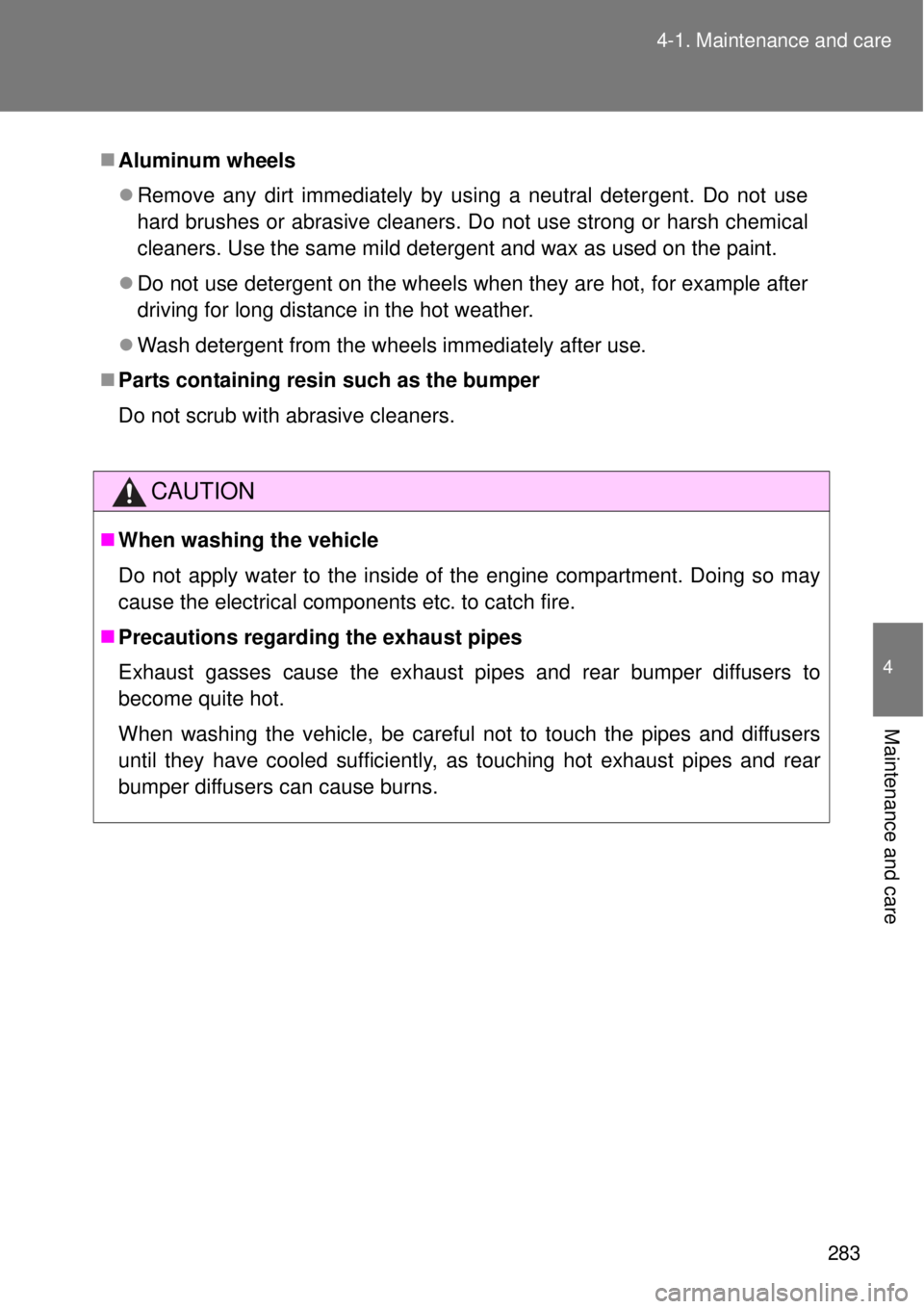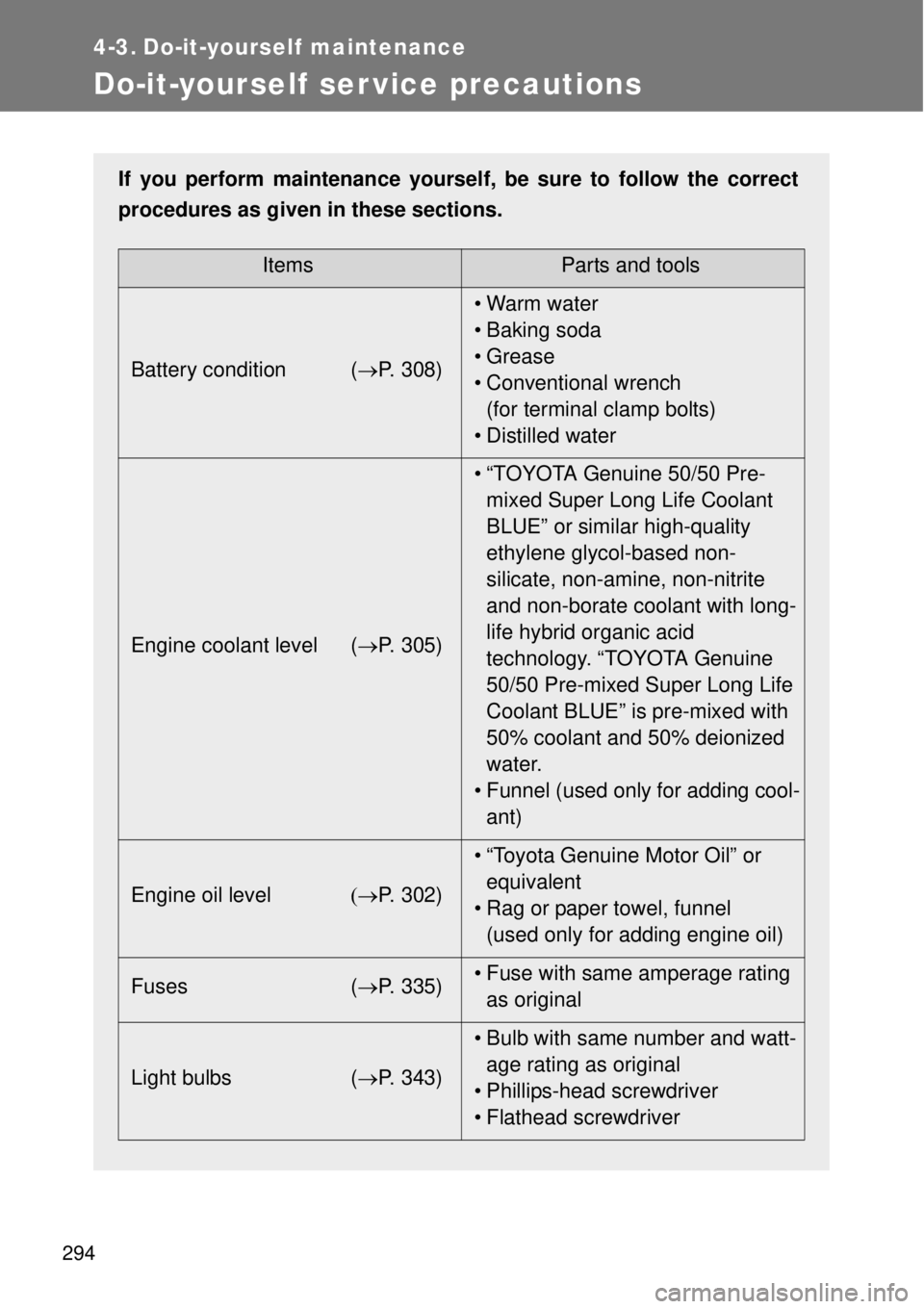Page 4 of 464

TABLE OF CONTENTSIndex
4
4-1. Maintenance and care
Cleaning and protecting
the vehicle exterior
............. 282
Cleaning and protecting
the vehicle interior ............ 285
Cleaning and protecting
the Alcantara
® area .......... 289
4-2. Maintenance
Maintenance
requirements..................... 291
4-3. Do-it-yourself
maintenance
Do-it-yourself service
precautions ....................... 294
Hood ................................... 297
Positioning a floor jack ........ 299
Engine compartment........... 301
Tires .................................... 314
Tire inflation pressure ......... 323
Wheels ................................ 325
Air conditioning filter ........... 328
Wireless remote control/
electronic key battery........ 331
Checking and replacing
fuses ................................. 335
Light bulbs .......................... 3435-1. Essential information
Emergency flashers ........... 362
If your vehicle needs to
be towed .......................... 363
If you think something is
wrong ............................... 370
Fuel pump shut off
system.............................. 371
5-2. Steps to take in
an emergency
If a warning light turns
on or a warning buzzer
sounds... ......................... 372
If you have a flat tire
(vehicles with
a spare tire) ...................... 384
If you have a flat tire
(vehicles with
an emergency tire
puncture repair kit) ........... 393
If the engine will
not start ............................ 409
If the shift lever cannot be
shifted from P ................... 412
If you lose your keys .......... 413
If the electronic key does
not operate properly ......... 414
If the battery is
discharged ....................... 418
4Maintenance and care5When trouble arises
Page 272 of 464
272 3-5. Other interior features
The power outlet can be used when
Vehicles without a smart entry & start system
The engine switch is in the “ACC” or “ON” position.
Vehicles with a smart entry & start system
The “ENGINE START STOP” switch is in ACCESSORY or IGNITION ON
mode.
NOTICE
To avoid damaging the power outlet
Close the power outlet lid when the power outlet is not in use.
Foreign objects or liquids that enter the power outlet may cause a short cir-
cuit.
To prevent the fuse from being blown
Do not use an accessory that uses more than 12 V 10 A.
To prevent battery discharge
Do not use the power outlet longer than necessary when the engine is not
running.
Page 281 of 464
4Maintenance and care
281
4-1. Maintenance and care
Cleaning and protecting
the vehicle exterior ......... 282
Cleaning and protecting
the vehicle interior .......... 285
Cleaning and protecting
the Alcantara
® area ........ 289
4-2. Maintenance
Maintenance
requirements................... 291
4-3. Do-it-yourself
maintenance
Do-it-yourself service
precautions ..................... 294
Hood ................................. 297
Positioning a floor jack ...... 299
Engine compartment......... 301
Tires .................................. 314
Tire inflation pressure ....... 323
Wheels .............................. 325
Air conditioning filter ......... 328
Wireless remote control/
electronic key battery...... 331
Checking and replacing
fuses ............................... 335
Light bulbs ........................ 343
Page 283 of 464

283 4-1. Maintenance and care
4
Maintenance and care
Aluminum wheels
Remove any dirt immediately by using a neutral detergent. Do not use
hard brushes or abrasive cleaners. Do not use strong or harsh chemical
cleaners. Use the same mild detergent and wax as used on the paint.
Do not use detergent on the wheels when they are hot, for example after
driving for long distance in the hot weather.
Wash detergent from the wheels immediately after use.
Parts containing resin such as the bumper
Do not scrub with abrasive cleaners.
CAUTION
When washing the vehicle
Do not apply water to the inside of the engine compartment. Doing so may
cause the electrical components etc. to catch fire.
Precautions regarding the exhaust pipes
Exhaust gasses cause the exhaust pipes and rear bumper diffusers to
become quite hot.
When washing the vehicle, be careful not to touch the pipes and diffusers
until they have cooled sufficiently, as touching hot exhaust pipes and rear
bumper diffusers can cause burns.
Page 294 of 464

294
4-3. Do-it-yourself maintenance
Do-it-yourself ser vice precautions
If you perform maintenance yourself, be sure to follow the correct
procedures as given in these sections.
ItemsParts and tools
Battery condition (P. 308)•Warm water
• Baking soda
• Grease
• Conventional wrench
(for terminal clamp bolts)
• Distilled water
Engine coolant level (P. 305)• “TOYOTA Genuine 50/50 Pre-
mixed Super Long Life Coolant
BLUE” or similar high-quality
ethylene glycol-based non-
silicate, non-amine, non-nitrite
and non-borate coolant with long-
life hybrid organic acid
technology. “TOYOTA Genuine
50/50 Pre-mixed Super Long Life
Coolant BLUE” is pre-mixed with
50% coolant and 50% deionized
water.
• Funnel (used only for adding cool-
ant)
Engine oil levelP. 302)• “Toyota Genuine Motor Oil” or
equivalent
• Rag or paper towel, funnel
(used only for adding engine oil)
Fuses (P. 335)• Fuse with same amperage rating
as original
Light bulbs (P. 343)• Bulb with same number and watt-
age rating as original
• Phillips-head screwdriver
• Flathead screwdriver
Page 301 of 464
301
4-3. Do-it-yourself maintenance
4
Maintenance and care
Engine compartment
*: For right-hand drive vehicles: This is located on the opposite side of the
engine compartment.
Battery* (P. 308)
Engine oil level dipstick
(P. 302)
Engine oil filler cap
(P. 303)
Washer fluid tank (P. 312)Electric cooling fans
Condenser (if equipped)
(P. 307)
Radiator (P. 307)
Engine coolant reservoir
(P. 305)
Fuse box (P. 335)
Page 335 of 464
335
4-3. Do-it-yourself maintenance
4
Maintenance and care
Checking and replacing fuses
If any of the electrical components do not operate, a fuse may have
blown. If this happens, check and replace the fuses as necessary.
Vehicles without a smart entry & start system
Turn the engine switch off.
Vehicles with a smart entry & start system
Turn the “ENGINE START STOP” switch off.
Open the fuse box cover.
Engine compartment
Push the tabs in and lift the lid
off.
Instrument panel
Remove the lid.STEP 1
STEP 2
Page 336 of 464
336 4-3. Do-it-yourself maintenance
After a system failure, see “Fuse layout and amperage rat-
ings” (P. 338) for details about which fuse to check.
Remove the fuse with the pull-
out tool.
Check if the fuse has blown.
Ty p e A
Normal fuse
Blown fuse
Replace it with one of an
appropriate amperage rating.
The amperage rating can be
found on the fuse box lid.
Ty p e B
Normal fuse
Blown fuse
Replace it with one of an
appropriate amperage rating.
The amperage rating can be
found on the fuse box lid.
STEP 3
STEP 4
STEP 5